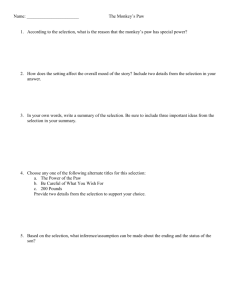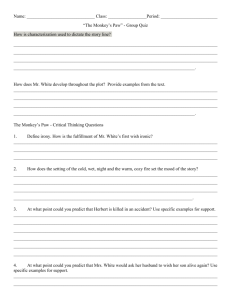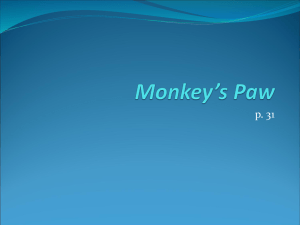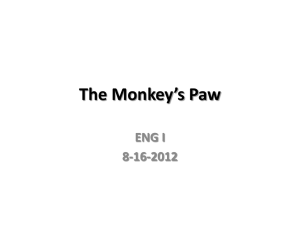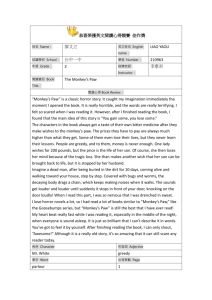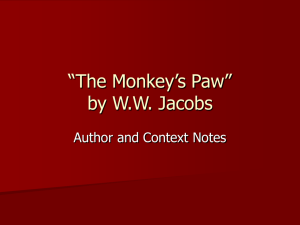“The Monkey's Paw,” many hints foreshadow future events. In an
advertisement
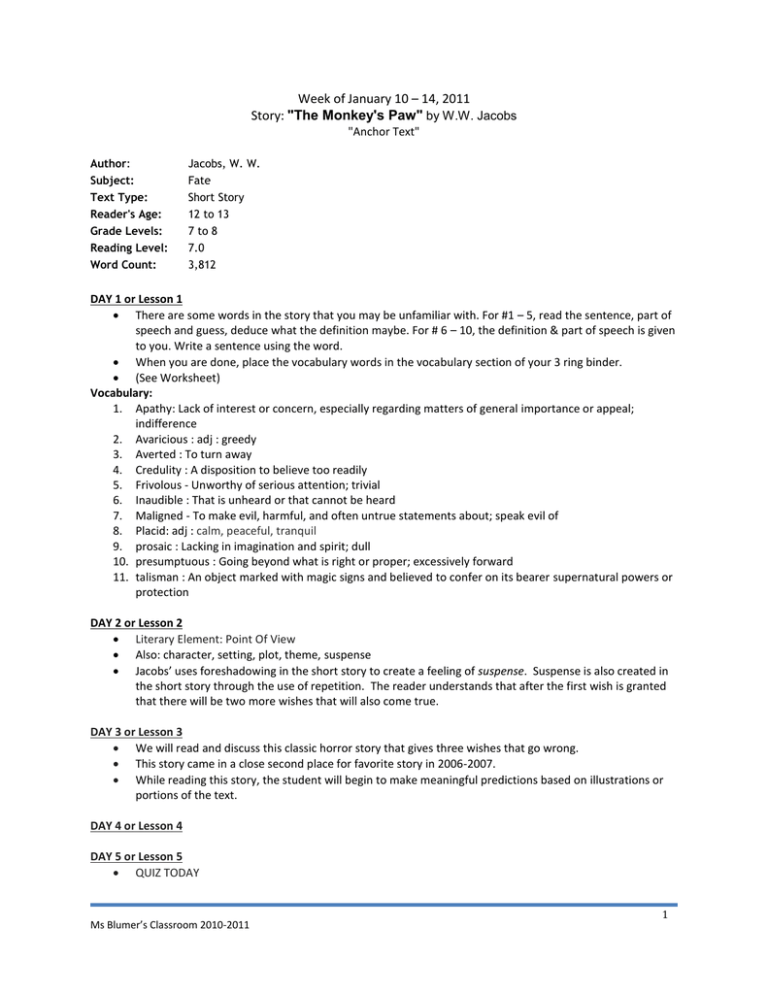
Week of January 10 – 14, 2011 Story: "The Monkey's Paw" by W.W. Jacobs "Anchor Text" Author: Subject: Text Type: Reader's Age: Grade Levels: Reading Level: Jacobs, W. W. Fate Short Story 12 to 13 7 to 8 7.0 Word Count: 3,812 DAY 1 or Lesson 1 There are some words in the story that you may be unfamiliar with. For #1 – 5, read the sentence, part of speech and guess, deduce what the definition maybe. For # 6 – 10, the definition & part of speech is given to you. Write a sentence using the word. When you are done, place the vocabulary words in the vocabulary section of your 3 ring binder. (See Worksheet) Vocabulary: 1. Apathy: Lack of interest or concern, especially regarding matters of general importance or appeal; indifference 2. Avaricious : adj : greedy 3. Averted : To turn away 4. Credulity : A disposition to believe too readily 5. Frivolous - Unworthy of serious attention; trivial 6. Inaudible : That is unheard or that cannot be heard 7. Maligned - To make evil, harmful, and often untrue statements about; speak evil of 8. Placid: adj : calm, peaceful, tranquil 9. prosaic : Lacking in imagination and spirit; dull 10. presumptuous : Going beyond what is right or proper; excessively forward 11. talisman : An object marked with magic signs and believed to confer on its bearer supernatural powers or protection DAY 2 or Lesson 2 Literary Element: Point Of View Also: character, setting, plot, theme, suspense Jacobs’ uses foreshadowing in the short story to create a feeling of suspense. Suspense is also created in the short story through the use of repetition. The reader understands that after the first wish is granted that there will be two more wishes that will also come true. DAY 3 or Lesson 3 We will read and discuss this classic horror story that gives three wishes that go wrong. This story came in a close second place for favorite story in 2006-2007. While reading this story, the student will begin to make meaningful predictions based on illustrations or portions of the text. DAY 4 or Lesson 4 DAY 5 or Lesson 5 QUIZ TODAY Ms Blumer’s Classroom 2010-2011 1 Teacher Notes Title: "The Monkey's Paw" Author: W.W. Jacobs Point of View: third-person narrative Setting: Time: Written in 1901 Place: House Mood: Horror Conflict: Man vs. Man (Rainsford vs. Zaroff), Man vs. Nature (Rainsford vs. quicksand/ocean) Theme: What do you think W. W. Jacob’s is trying to relate to the reader about fate? It is that it should bring you all you want, but it only brings misery. Characters: 1. Name: Mr White (Father) Personality description: Physical description: 2. Name: Mrs White Personality description: Physical description: 3. Name: Herbert White Personality description: Physical description: 4. Name: Major Morris Personality description: Physical description: Literary Terms and Techniques Plot Details: Exposition – Rising action – Climax – Falling action – Resolution – Alliteration – Flashback – Foreshadowing – Instances of foreshadowing occur in “The Monkey’s Paw” when the sergeant is reluctant to speak of the monkey’s paw, and when he says the last man to handle the paw had wished for his own death. Imagery – Ms Blumer’s Classroom 2010-2011 2 Irony –There are many instances of verbal irony in “The Monkey’s Paw” When Herbert says “Well, I don’t see the money and I bet I never shall” (page 33) his statement becomes verbally ironic because he actually does not get to see the money, though his comment at the time is meant only as a statement of disbelief over the supernatural powers in the monkey’s paw. There are many instances of verbal irony in “The Monkey’s Paw” When Herbert says “Well, I don’t see the money and I bet I never shall” (page 33) his statement becomes verbally ironic because he actually does not get to see the money, though his comment at the time is meant only as a statement of disbelief over the supernatural powers in the monkey’s paw. Metaphor – Personification – Simile – Symbolism – Ms Blumer’s Classroom 2010-2011 3 Name _________________________________ "The Monkey's Paw" Date _________________________________ Vocabulary: English 7 Directions: There are some words in the story that you may be unfamiliar with. For some of the sentences I have given you the part of speech and definition. For the others I have given you the part of speech and a sentence. Your job is to fill in the missing blank given the information. When you are done, place the vocabulary words in the vocabulary section of your 3 ring binder. Part of Speech Apathy Definition Lack of interest or concern, especially regarding matters of general Sentence adjective Avaricious greedy Verb Averted Credulity To Turn Away A disposition to believe too readily Ms Blumer’s Classroom 2010-2011 4 Frivolous Unworthy of serious attention; trivial Inaudible That is unheard or that cannot be heard Maligned Placid prosaic To make evil, harmful, and often untrue statements about; speak evil of calm, peaceful, tranquil Lacking in imagination and spirit; dull Ms Blumer’s Classroom 2010-2011 5 presumptuous talisman Going beyond what is right or proper; excessively forward An object marked with magic signs and believed to confer on its bearer supernatural powers or protection Ms Blumer’s Classroom 2010-2011 6 Name: ______________________________________________ Date: ___________ Literary Analysis Skill Builder Conflict Most stories are built around a central conflict, or struggle between people, or between people and nature, an obstacle, or society. Sometimes the struggle may go on inside a character. An external conflict involves a character pitted against an outside force. An internal conflict occurs when the struggle takes place within a character’s own mind. List instances of each kind of conflict in the story. Then answer the questions. Internal Conflict Mr. White Mrs. White External Conflict Person vs. Person Person vs. Nature Person vs. Obstacle Follow Up: On the back of this paper answer the following questions Which conflicts added the most excitement to the story? Which revealed something important about one of the characters? Explain. Why do you think Connell included the other conflicts that you identified? Ms Blumer’s Classroom 2010-2011 7 RECIPROCAL TEACHING STRATEGIES WORKSHEET (non-fiction) Predict. I think I will learn that ___________________________________________________________________________ _____________________________________________________________________________________________ because ______________________________________________________________________________________ _____________________________________________________________________________________________ List Main Ideas. As you finish reading each paragraph or key section of the passage, summarize the main idea of that paragraph or section in one or two complete sentences. Then Generate Questions. For each main idea listed, write down at least one question that the main idea will answer. Good questions should include words like “who, “where”, “when”, “why”, and “what”. Main Idea 1: ___________________________________________________________________________________ _____________________________________________________________________________________________ Question 1. ____________________________________________________________________________________ _____________________________________________________________________________________________ Main Idea 2: ___________________________________________________________________________________ _____________________________________________________________________________________________ Question 2. ____________________________________________________________________________________ _____________________________________________________________________________________________ Main Idea 3: ___________________________________________________________________________________ _____________________________________________________________________________________________ Question 3. ____________________________________________________________________________________ _____________________________________________________________________________________________ CLARIFY 1. __________________________ is a difficult word because ___________________________________________. So I (check the strategies that you used) __ checked parts of the word that I know, __ sounded out the word, __thought of a word that looks like this, __ read on to find clues, __ reread to find clues, __tried another word. 2. _______________________________________________________________ is a confusing idea or part because _____________________________________________________________________________________________. So I (check the strategies that you used) __reread, __read on, __thought about what I know, __ talked to a friend. Summarize. Here is a one to three sentence summary: ____________________________________________ Ms Blumer’s Classroom 2010-2011 8 _____________________________________________________________________________________________ _____________________________________________________________________________________________ _____________________________________________________________________________________________ _____________________________________________________________________________________________ _____________________________________________________________________________________________ _____________________________________________________________________________________________ _____________________________________________________________________________________________ Ms Blumer’s Classroom 2010-2011 9 Name _______________________________________ “The Monkey’s Paw” by W.W. Jacobs Date ___________________ Friday - Quiz Selection Test Critical Reading In the blank, write the letter of the one best answer. ____ 1. What is “The Monkey’s Paw” about? a. a retired sergeant major who brings a magical monkey’s paw from India b. an unsuspecting son who dies as a result of his mother’s greed c. a monkey’s paw that grants three wishes to three different people d. a magical but evil monkey’s paw that ruins the quiet life of a family ____ 2. Which of the following phrases from “The Monkey’s Paw” best describes the Whites’ lives before the first wish is granted? a. “wild scenes and doughty deeds” b. “an air of prosaic wholesomeness” c. “steeped in shadow and silence” d. “the hopeless resignation of the old” ____ 3. In “The Monkey’s Paw,” which of the following lines spoken by Mr. White hints that the wishes can only change his life for the worse? a. “And what is there special about it?” b. “It seems to me I’ve got all I want.” c. “. . . there’s no harm done, but it gave me a shock all the same.” d. “. . . the things happened so naturally. . . .” ____ 4. Which of the following lines from “The Monkey’s Paw” is an example of foreshadowing? a. “When he went away he was a slip of a youth in the warehouse.” b. “I should like to see those old temples and fakirs and jugglers. . . .” c. “[The monkey’s paw] has caused enough mischief already.” d. “Did you give him anything for it, Father?” ____ 5. Which of the following lines from “The Monkey’s Paw” foreshadows what happens to Herbert? a. “. . . I don’t see the money . . . and I bet I never shall.” b. “Why, we’re going to be rich, and famous and happy.” c. “If you only cleared the house, you’d be quite happy. . . .” d. “I expect you’ll find the cash tied up in a big bag. . . .” ____ 6. In “The Monkey’s Paw,” when a stranger comes to the Whites’ door, Mrs. White thinks at first he has come to a. announce Herbert’s death. b. give Mr. White 200 pounds. c. ask them for the monkey’s paw. d. present a bill from the tailor. ____ 7. In “The Monkey’s Paw,” Herbert is “. . . caught in the machinery. . . .” In this context, machinery may also indicate the effects of ______. Ms Blumer’s Classroom 2010-2011 10 a. destiny b. carelessness c. everyday life d. industrialization Unit 1: On the Edge ____ 8. In “The Monkey’s Paw,” when Maw and Meggins offers Mr. White compensation, he faints because he a. is overcome with grief by Herbert’s death. b. knows he should have wished for something else. c. realizes he sold his son for 200 pounds. d. cannot bear the anguished cries of his wife. ____ 9. In “The Monkey’s Paw,” why is Mr. White afraid to wish a second time? a. He does not believe the paw can grant wishes. b. He is so grief stricken that he forgets the paw. c. He has become apathetic since Herbert’s death. d. He realizes his wishes can have only bad consequences. ____ 10. At the end of “The Monkey’s Paw,” what does Mrs. White realize just after she opens the front door? a. Her husband has made the third wish. b. The monkey’s paw killed her son. c. She no longer wants her son to return. d. The knocking sound is not Herbert. ____ 11. A central idea of “The Bridegroom” is that a. parents often fail to understand their children. b. matchmakers do not know what real love is. c. dreams sometimes reveal what the future holds. d. charming exteriors can hide awful truths. ____ 12. Why does Natasha fear the bridegroom? a. He plans to punish her for spying on him. b. He is a wealthy lord who bows to no one. c. She saw what he did to the other woman. d. He threatened her when she was in the hut. ____ 13. In “The Bridegroom,” what is the most likely reason that Natasha chooses at the wedding feast to tell her story as if she dreamt it? a. to avoid revealing that she had been in the hut b. to make her fears seem real until she can prove them c. to make the guests believe that she is a prophetess d. to warn the bridegroom that she knows his true intentions ____ 14. In “The Bridegroom,” Pushkin draws upon themes from a. supernatural events. b. folklore. c. social reform. d. upper-class customs. Ms Blumer’s Classroom 2010-2011 11 ____ 15. Which of the following details in “The Bridegroom” foreshadows the groom’s fate? a. Natasha’s disappearance b. Natasha’s first reaction to the handsome young man c. the matchmaker’s unexpected visit d. Natasha’s request to invite the law Vocabulary and Grammar ____ 16. Which of the following sentences contains a pronoun that does not agree with its antecedent? a. Mr. White tried, unsuccessfully, to distract his son during a chess game. b. The visitor brought bad news to the Whites; he told him that their son was dead. c. Mr. White could not have known the results of his first wish. d. Sergeant Morris took the monkey paw and threw it upon the fire. ____ 17. Which of the following words or phrases is closest in meaning to the word maligned? a. praised b. lingered c. flattered d. slandered ____ 18. Which of the following words is most nearly opposite in meaning to the word tumult? a. order b. commotion c. chaos d. tremor ____ 19. Though upset by ________ betrothal to the groom, Natasha devised a plan that would bring the young man to justice. a. his b. its c. her d. their ____ 20. What is the antecedent of the word them in the following sentence? After she calmed down, Natasha asked her parents to prepare a feast for the guests and told them to invite the law. a. Natasha c. guests b. parents d. law Essay Questions 21. In “The Monkey’s Paw,” many hints foreshadow future events. In an essay, identify two examples of foreshadowing from the selection, and explain in detail the specific future events they suggest. 22. What might have happened to Natasha had she married the handsome bridegroom? In an essay, explain your prediction and identify evidence in Pushkin’s ballad that helped you to make it. 23. “The Monkey’s Paw” comes to a disturbing end. What does the father understand that the mother does not? How would the ending be different had Mrs. White opened the door before Mr. White made his third wish? Why were you surprised or not surprised by the story’s conclusion? Answer these questions in an essay, and support your main points with details from the story. Ms Blumer’s Classroom 2010-2011 12
